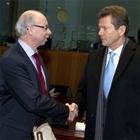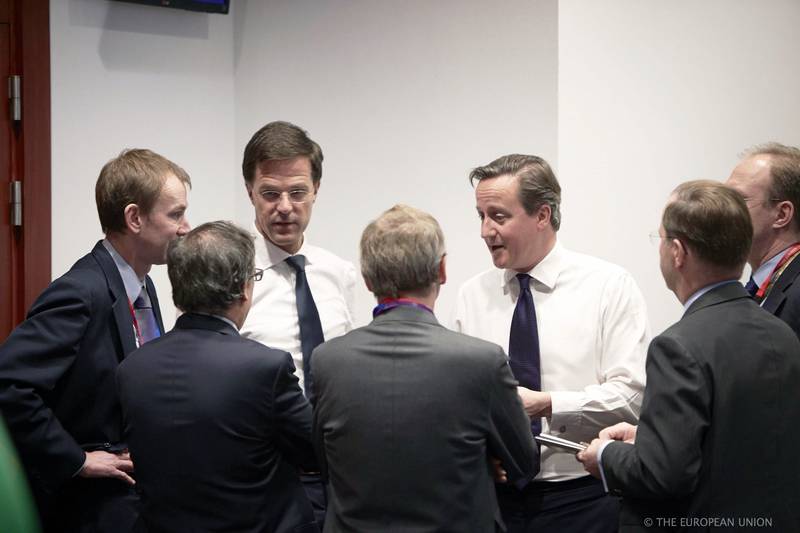No External Competitiveness without Internal Cohesion
Adelina Marini, December 1, 2011
 On the 30th of November in Sofia the first more serious conference took place on the next multiannual financial framework (for the period 2014-2020), organised by the embassy of Poland in Bulgaria and the Centre for Economic Development. euinside participated as a moderator of the first panel "The Added Value of the EU Budget: Win-Win or a Zero Sum Game?". It is the added value that is the basis of the already heated debates at the European level.
On the 30th of November in Sofia the first more serious conference took place on the next multiannual financial framework (for the period 2014-2020), organised by the embassy of Poland in Bulgaria and the Centre for Economic Development. euinside participated as a moderator of the first panel "The Added Value of the EU Budget: Win-Win or a Zero Sum Game?". It is the added value that is the basis of the already heated debates at the European level.
Cohesion policy with conditionality or not
The European Commission has come up with a proposal for the structure of the next 7-year Community budget yet in the summer and since then the deliberations are constantly gaining velocity to escalate, as is the tradition, in the end of the current period when specific numbers will be debated. The latest debate took place in the General Affairs Council of the EU (where the ministers of foreign affairs are represented) on November 15th and it was that council where several very important trends have been outlined at. First of all, Germany has already put a number on the table (yes, so soon). The country announced that the size of the budget should not surpass 1% of gross national income (GNI). The current budget is a little bit above that size and the negotiation of the tenth of the percentage took months during the British presidency in 2005.
Another trend, quite expectedly, is related to financially the most volumetric programmes - the Cohesion Policy (CP) and the Common Agricultural Policy (CAP). In the very beginning of the public deliberations the EU Commissioner, responsible for the budget, Janusz Lewandowski, recalled briefly that, although it is not envisaged the budget to be increased for the next programming period, nominally the two biggest expenditure headings were practically frozen. He explained the logic behind the big changes in the structure of the budget with the need to add more value to the European investments precisely in a moment of a crisis. Mr Lewandowski noted, however, that although it was born in a crisis this budget was not a pro-crisis budget but with a  horizon - the year 2020.
horizon - the year 2020.
Yet in the very beginning quite clearly two camps emerged - of the developed, mainly Nordic countries, led by the Scandinavian states, who said they were against increasing spending in the budget and even called for spending cuts in the CAP and the Cohesion Policy, as well as for reducing the expenditure for the administration. They insisted for more investment in science and innovation. The other camp, quote vocal too, was of the countries experiencing serious fiscal and economic troubles, as well as most of the new member states. Moreover, the noisy camp of the defenders of the status quo emerged united in a camp, called "Friends of Cohesion Policy", consisting of 13 countries: Bulgaria, the Czech Republic, Lithuania, Latvia, Greece, Estonia, Romania, Malta, Portugal, Slovakia, Slovenia, Spain and Hungary. Quite surprising was the position Bulgaria's Foreign Minister Nickolay Mladenov defended, almost entirely overlapping the Nordic vision about the budget.
The position of the "friends" of the Cohesion Policy was presented by Hungary's Foreign Minister Janos Martonyi. In its foundation is the 13's wish, which were half-heartedly joined by Italy, the cohesion policy to remain a strong integrated development tool with a similar level of financing as in the current financial period. According to the 13 countries, any changes in the structure of the policy should not be to the detriment of increasing the disparities between regions. Besides, these countries deem, CP is extremely important for achieving the goals of Europe 2020 strategy. "Therefore it's not outdated and does not mean wasted money", the Hungarian minister added on behalf of the 13.
Mr Martonyi also emphasised that there was no external competitiveness of the EU without internal cohesion. According to the Nordic camp, however, CP should be reduced only to the poorest of regions in a sign of solidarity. Besides, according to Sweden, whose opinion was shared by Finland, Germany and Bulgaria too, the level of co-financing from the Cohesion Fund should remain 75%, and not as the Commission proposes between 85% and 75% because of the countries that currently experience fiscal difficulties and cannot absorb EU money because of drastic budget spending cuts. The worst hit in this regard are the countries with bailout programmes, particularly Greece.
In fact, the greatest objections regarding the CP were raised regarding conditionality, introduced with the Commission's proposal. The idea is to introduce preconditions when applying for funding, as well as further conditions in order to secure the release of the rest of the money. For example, if a country wants European funding in order to invest in water management, it will have to transpose the entire European environment legislation. The Commission and the member states will agree on a certain deadline for the full transposition of the European legislation and if a member state does not stick with the deadline the EU funds will be suspended entirely or partially on a certain programme.
 Big opposition was expressed against macroeconomic conditionality. According to the Commission, the recent experience shows that in a lot of places CP, the main purpose of which is to boost growth and employment, has not delivered the needed results, to a large extent because of not solid macroeconomic conditions. This is why it is recommended a closer link between the CP and the European Semester for coordination of economic policy. According to many countries, though, this would additionally punish the already needing help countries. According to Portugal, which is a country in a rescue regime, this conditionality would hit hardest those countries that need the cohesion policy the most. Moreover, the double sanctioning must be avoided for the countries in the euro area, because they are also subjected to sanctions under the Six Pack of legislative proposals for EU's economic governance.
Big opposition was expressed against macroeconomic conditionality. According to the Commission, the recent experience shows that in a lot of places CP, the main purpose of which is to boost growth and employment, has not delivered the needed results, to a large extent because of not solid macroeconomic conditions. This is why it is recommended a closer link between the CP and the European Semester for coordination of economic policy. According to many countries, though, this would additionally punish the already needing help countries. According to Portugal, which is a country in a rescue regime, this conditionality would hit hardest those countries that need the cohesion policy the most. Moreover, the double sanctioning must be avoided for the countries in the euro area, because they are also subjected to sanctions under the Six Pack of legislative proposals for EU's economic governance.
However, Romania thinks that there is no problem with ex ante conditionality as long as it is based on clear criteria. And regarding macroeconomic conditionality, Bucharest is reluctant to support the proposal. Bulgaria, on its part, warned that weakening of the cohesion policy was extremely dangerous, which was why it was crucial to keep a sufficient level of funding, at least as is the current level. Regarding the conditionality, though, Sofia supports and even recommends this conditionality to be applied not only to the Cohesion Fund but to all the other policies, because otherwise it will be uneven and unfair. Moreover, Bulgaria supports co-financing to remain at the current level of 75%.
Another controversy, raised by the newer member states, including Bulgaria, was the introduction of a ceiling of 2.5% of GNI of a member state when receiving money from the Cohesion Fund. To compare, in the current framework this share is 4%. The reason for this decision is that in the current period (2007-2013) the member states in general demonstrate low absorption capacity, there are delays of projects and the overall assessment is that a lot of money is left unabsorbed. The sharpest objection was made by the Baltic states. EU Commissioner Lewandowski responded by recalling that it was the Baltic states (Latvia, Lithuania, Estonia) that received gross transfers from Brussels of 5% or net transfers of 4% which was a sign of solidarity. But, he underscored, the Baltic states were not the poorest. The poorest are Bulgaria and Romania, but for them too transfer is being reduced.
Regarding the Common Agriculture Policy, as the debates so far have shown, the most controversial points remain the green measures, the levelling of direct payments and the rural areas development.
During the debate, in the questionnaire of the Polish Presidency there was a  question about the new initiative for development of the transport infrastructure in the EU - Connecting Europe. When the discussions became too serious it was Finland's minister of foreign affairs and trade Alexander Stubb's turn. He played a game of words with the name of the initiative thus making the deliberations quite lively, praising the Commission for the product positioning of Nokia, whose slogan is Connecting People. Stubb started his introductory with the fact that the deliberations were webcast live and announced that obviously the reality TV was already part of the game. He said that he expected to see in the end of the session what was the number of viewers.
question about the new initiative for development of the transport infrastructure in the EU - Connecting Europe. When the discussions became too serious it was Finland's minister of foreign affairs and trade Alexander Stubb's turn. He played a game of words with the name of the initiative thus making the deliberations quite lively, praising the Commission for the product positioning of Nokia, whose slogan is Connecting People. Stubb started his introductory with the fact that the deliberations were webcast live and announced that obviously the reality TV was already part of the game. He said that he expected to see in the end of the session what was the number of viewers.
Polish State Secretary for EU Affairs Mikolaj Dowgielewicz, who chaired the session, accepted the challenge by saying that 1 in every million viewers watched via the Internet the webcast, which was twice as the usual number. "But, nevertheless", he added "we have to deduct Alex from the this number", because he was present in the room and was watching all the time the deliberations on his tablet, complaining from the sound delay, which caused sincere laughter in the room after two hours and a half of discussions.
The next big debate will be in December, again in the same format.
 Kristalina Georgieva | © Council of the EU
Kristalina Georgieva | © Council of the EU Mark Rutte, David Cameron | © Council of the EU
Mark Rutte, David Cameron | © Council of the EU | © European Parliament
| © European Parliament